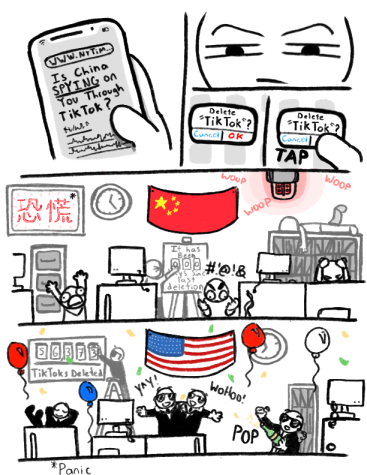Good politics or good protection.
Those were the two main arguments in the air when TikTok CEO Shou Zi Chew testified before members of Congress in March about the popular social media app’s data security practices. The hearing was purported to be Congress’s attempt to learn how to protect Americans’ personal data from data breaches conducted by the Chinese government.
However, the hearings have turned into a political fight over foreign social media influences.
“Welcome to the most bipartisan committee in Congress,” Republican Rep. Earl LeRoy Carter said. “I don’t speak for everyone, but there are those on this committee, including myself, who believe that the Chinese Communist Party is engaged in psychological warfare through TikTok to deliberately influence US children.”
Chew’s responses to questions were often cut short as members of Congress asked for “yes” or “no” responses or moved on to make their own political points.
To understand the controversy around TikTok, we have to go back to when Trump was President. In July 2018, the Trump Administration announced tariffs on Chinese imports, and the Chinese retaliated by raising tariffs on U.S. imports. This effectively began the U.S.-China Trade War. It worsened when, on May 15th, 2019, Chinese telecom giant Huawei was banned through an executive order signed by then-President, Donald Trump. Huawei was banned citing “security concerns”.
American regulators did not like Chinese companies having access to American cell towers. So, on May 26th, Huawei was put on an entity list, forcing American companies to cease business with Huawei. This ban would put us in the position we are in today. Which is that Congress wants to ban TikTok.
TikTok is owned by ByteDance, a Chinese company. It’s used by 150 million Americans, roughly 45% of the U.S. population. However, the big problem that Congress has with TikTok is that the Chinese Government can force Chinese companies to hand over data. The Eagle’s Eye survey has found that 74% of the 100 students surveyed did not know that such a law exists. So Congress and Biden issued an ultimatum — sell TikTok to another company or be banned.
TikTok launched in the U.S. in 2018, and within one year, it had over 1 billion combined installs from the Google Play Store and Apple’s App Store. In late 2019, the U.S. Government opened security probes into TikTok because of concerns over data security.
In December 2019, the Pentagon banned U.S. sailors from using TikTok on Navy devices. In Aug. 2020, Trump signed an executive order intended to ban American companies from engaging in business with ByteDance. Following a protracted legal battle between the Trump administration and ByteDance, the order was ultimately overturned by President Joe Biden. To appease U.S. officials, ByteDance created a plan to work with U.S. server company Oracle for it to house all of TikTok’s data for the United States. It’s part of a corporate restructuring plan called “Project Texas,” which is aimed at instilling American confidence in TikTok’s operations and security.
According to a Texas Monthly article, under Project Texas, TikTok’s American operations would be siloed and monitored by an in-house committee called TikTok U.S. Data Security—leadership for which would be approved by the U.S. government. Under the new organizational structure, TikTok would also utilize the Committee of Foreign Investment in the United States, an interagency U.S. governmental committee that has handled TikTok negotiations for the last few years, as a third-party security resource.
Additionally, Oracle would be able to review TikTok’s code and software in “transparency centers,” and monitor global data flows necessary to allow U.S. TikTok users to engage with the app’s international content. The U.S. government will reportedly also be able to access the transparency centers.
The big question now is whether TikTok can still snoop on U.S. citizens. Today, TikTok is banned on U.S. Government devices and 32 out of 50 states have enforced a ban on TikTok on government devices. The UK also has a similar ban, and NATO, the North Atlantic Treaty Organization, has banned TikTok on all NATO devices.
When asked about whether TikTok should be banned in the U.S., 79% of Akins students did not support the ban. This is compared to the entire United States, in which a Pew Research Center survey found that half the U.S. population supports a ban. The answer gets even more complicated when people consider how a ban on TikTok affects how people consume and share news.
Sophomore Nicolas Robedro said a lot of TikTok content is related to local and global news “to the point I would say it could affect some people who get their news from TikTok.”
“At the same time, it could be beneficial as TikTok is often soaked in inaccurate and biased news,” he wrote in his survey response.
On March 23, 2023, TikTok CEO Shou Zi Chew was called to testify in front of a Congressional Committee about concerns over how TikTok handles user data. Throughout his testimony, Chew repeatedly affirmed that TikTok won’t hand data over to the Chinese government, and that TikTok will protect its younger users.
“Protecting its users will be Tik To k’s first priority,” Chew said. As of last week, TikTok also got hit with a fine for not protecting children’s data. Many analysts agreed that Chew’s testimony was not enough to assuage the fears of elected officials seeking to ban the app. The main question on lawmakers minds is, can TikTok protect people’s privacy? While the answer is inconclusive about whether it can, critics of a ban have said that lawmakers are focusing on the wrong aspect of this whole TikTok debacle. Instead of focusing exclusively on TikTok, critics argue that policymakers and the President should be working on passing a law that would provide comprehensive user internet data protections that would cover all companies and not just TikTok.
k’s first priority,” Chew said. As of last week, TikTok also got hit with a fine for not protecting children’s data. Many analysts agreed that Chew’s testimony was not enough to assuage the fears of elected officials seeking to ban the app. The main question on lawmakers minds is, can TikTok protect people’s privacy? While the answer is inconclusive about whether it can, critics of a ban have said that lawmakers are focusing on the wrong aspect of this whole TikTok debacle. Instead of focusing exclusively on TikTok, critics argue that policymakers and the President should be working on passing a law that would provide comprehensive user internet data protections that would cover all companies and not just TikTok.
The European Union (EU) has laws that protect what data can be collected and requires companies to be transparent. A major one that was passed was the General Data Protection Regulation, known as GDPR, which allows users to control how their data is used. Companies have twisted the GDPR, and made it annoying to use the internet. This is why we have too many pop up ads asking about cookies. The companies say they are just complying with the GDPR, but they are also making it annoying to use websites.
The U.S. on the other hand, has very few laws like these. California is the only state that directly protects internet users with state laws known as the California Consumer Privacy Act of 2018 (CCPA) and the California Privacy Rights Act (CPRA). These laws give consumers the right to know which personal information was collected, the right to delete that information, and the right to opt out of the sale of personal information. They also give users the right to correct inaccurate personal information.
Federally, there isn’t one law that protects what data companies can collect. A couple of states such as Colorado, Connecticut, Utah, and Virginia are set to pass data protection laws this year. In most states, however, it’s legal for companies to use, collect, and share your data without you notifying users.
However, survey results suggest that many people don’t really care about what data companies collect. When asked about whether students were worried about what data the Chinese Government collects through TikTok, The Eagle’s Eye survey found that 50 percent of students responded that they weren’t worried.
The bill that could allow the President to ban apps like TikTok is called the RESTRICT. Act. It would allow the Department of Commerce to ban desktop applications, mobile applications, gaming applications, payment applications if they were linked to an adversary of the United States. This could include countries like China (including Hong Kong), Cuba, Iran, North Korea, Russia, and Venezuela.
While the RESTRICT act might sound like a good thing, it may be more dangerous than it sounds. The vague wording of this bill could be used against VPN’s, which many people use. If this bill is passed, then those who use a VPN to access TikTok could be prosecuted. The debate stems from the part of the bill that says “no person may engage in any transaction or take any other action with intent to evade the provisions of this Act.”
Sen. Mark Warner, one of the bill’s authors, has explicitly stated that there are no criminal penalties in this bill that would violate free speech rights.
“You’re even free to drag the RESTRICT Act if you want! I stand firmly with freedom of speech, and my bill doesn’t affect or influence what Americans can say in any way, shape or form,” he wrote in a lengthy Twitter thread to reply to critics of the bill.
In short, the bill could be interpreted in many ways and that’s the problem people have with the bill.
Shortly after this bill was introduced, a viral post claimed that the act would give the government access to your smart home devices. These posts have been debunked. The fourth amendment protects american’s right to privacy, and the company would have to be owned by a foreign adversary for the government to demand information from the company under investigation.
Sadly, the focus on banning TikTok seems like it has stolen the focus on another bill introduced in June 2022 called the American Data Privacy and Protection Act (ADPPA). The bill would’ve banned data collection only if it was necessary for it to be collected. However, it does allow data to be collected for targeted advertising. However, it would ban targeting ads to minors, and prevent ads based on sensitive data. It would also prevent companies like Google and Facebook from putting trackers on you and following you through the internet. The bill would’ve made it easier for users to opt-out of targeted advertising.
Even though this bill passed with unanimous approval in the House Energy and Commerce Committee, ADPPA stalled in Congress and did not pass before the 117th U.S. Congress adjourned in December. However, with the renewed calls for data protection rising after the TikTok debacle, the chances of a data protection bill being passed are likely. President Biden has even been calling on Congress to pass such a bill.
What the future looks like for TikTok and U.S. data protection, is unclear. What is clear is that we are living in an important era of our nation’s history that could change how our future generations live for decades to come if either the Restrict Act or the ADPPA is passed.




